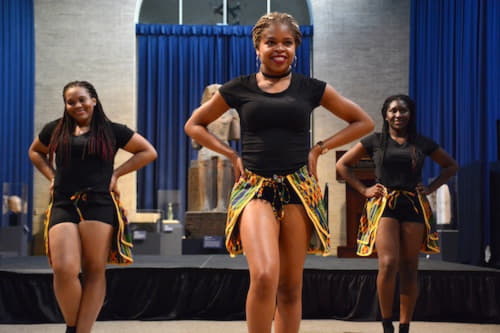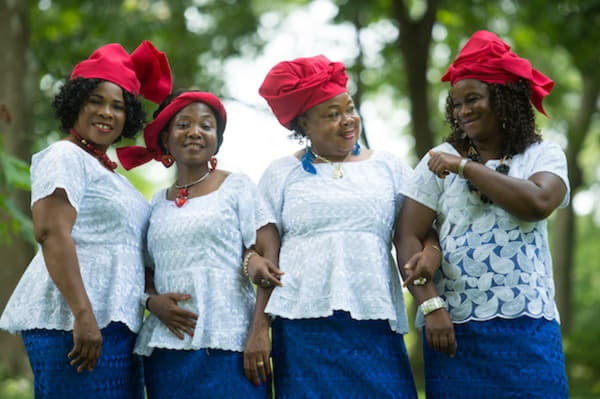
Traditional African music and contemporary African dance, storytelling, a drumming workshop, arts, crafts, an African marketplace, games, family gallery tours, films, and more—it all comes alive at the Penn Museum’s 28th annual Celebration of African Cultures on Saturday, February 25, 11:00 am to 4:00 pm. The celebration, presented in the Museum’s African galleries and around the Museum, is free with Museum admission ($15, general admission; $13, seniors [65+]; $10, children [6-17] and full-time students [with ID]; $2 ACCESS and Museums for All cardholders; free to children under 5, members, active U.S. Military, STAMP and PennCard holders).
Community partners for the day’s celebration include the Ethiopian Community Association of Greater Philadelphia, the African Family Health Organization, AFRICOM, the Coalition of African and Caribbean Communities in Philadelphia, and the University of Pennsylvania’s Center for Africana Studies.
100.3 WRNB’s Lady B and the promo crew join in the festivities, with lots of fun, prizes and surprises in store, from noon to 2:00 pm.
Shake your Sekere and Dance, Dance, Dance
West African Vibe (WAVe), is a modern West African dance group that performs to a variety of contemporary Afrobeat artists from across the region. At 2:30 pm, about 15 of the group’s 20 members offer a short dance “mash up” of some of their best performances, followed by a short workshop, as the audience is invited to learn a few of the group’s dance moves!
Culture Shock is a multicultural dance group affiliated with the University of the Sciences’ International Society, a student organization responsible for representing students from all over the world. The group applies elements of traditional music to modern dance performances. For this year’s event, Culture Shock’s performance will reflect traditional dances from areas of both East and West Africa, with hints of Caribbean influence—and some African Belly dance. They take the stage at 1:30 pm.
The Women's Sekere Ensemble infuses the Museum galleries with the rhythms and tones of the sekere, a traditional Nigerian percussion instrument made from intricately beaded gourds, and an agogô, a bell with origins in traditional Yoruba music. Dedicated to the preservation of African music, the percussionists, led by Omomola Iyabumni, perform at 12:00 noon and again at 2:15 pm.
Guests are encouraged to bring a drum or instrument to the Celebration, to join master percussionist Abba Paul Lucas, who invites guests to experience the rhythm within, at an African Drum Workshop at 3:00 pm. (A limited number of percussion instruments will be available to borrow.)

The Liberian Women's Chorus for Change concludes the day’s rich line up of performances with a concert at 3:30 pm. The Chorus, partnering with the Philadelphia Folklore Project, brings the power of Liberian traditional song to the forefront of efforts to make communities safe and strong. Composed of renowned singers and dancers from Liberia -- Fatu Gayflor, Marie Nyenabo, Zaye Tete, and Tokay Tomah -- the Chorus inspires awareness and dialogue about domestic violence and other concerns of the approximately 15,000 Philadelphia-area Liberian immigrants.
Stories, Tours, Films, and Games
The Watoto of Joy youth group, part of Philadelphia’s Keepers of the Culture Afro-centric storytelling group, perform African stories at 12:30. The youth group recently performed at the 34th “In the Tradition” annual national Black Storytelling Festival and Conference held in Philadelphia in the fall.
Families can join in on an African object-focused gallery tour, led by members of the Penn Museum’s new Teen Ambassadors program, at 11:00 am and again at 2:00 pm.
Penn Museum’s Archives joins in the day, presenting an award-winning short film for children and families, Mwansa the Great (2011), directed by Rungano Nyoni, and introduced by Film Archivist Kate Pourshariati, at 11:30 am and again at 1:00 pm.
The Teen Ambassadors are on hand to teach and guide guests who want to learn to play African games. Visitors can learn to play the traditional "board" game mancala, which originated in West Africa, playing on traditional Mancala boards in the Learning Programs Department’s teaching collection. Today, the game is known as poo in some parts of Liberia, warri in Barbados, conka in Indonesia, and Swahili-speaking cultures along the east coast of Africa play a complex variation called bao. Mancala and other African games will be taught at an African games drop-in workshop throughout the day.
Kids and families are invited to design an African mask memento at a make-and-take crafts station.
An African Marketplace and African Foods
Throughout the celebration, visitors have the chance to browse and shop at an African mini-marketplace featuring wooden, leather, and bronze accessories, as well as colorful prints, art, jewelry and apparel available for purchase, from special vendors, including Rashida Watson of The Silk Tent, Puyâ Yohannes of Bole Lig, Chakir Bouchaib of Little Marrakesh Bazaar, and Desiree Langford of Nayaz Boutique. Guests can also stop by the Museum Shop, which features a collection of African-inspired and fair trade, African-made items.
The Pepper Mill Café also gets into the spirit, offering an African-inspired lunch menu and snacks for purchase.
Signature Galleries

The Africa Gallery features objects from cultures throughout the continent. Highlights include Akan gold weights, and musical instruments made from wood, skins, gourds, and plant fibers. The Museum was among the first American museums to begin collecting art and artifacts from Africa; most items in the collection were obtained between 1891 and 1930.
The Museum’s renowned Egypt (Sphinx) and Egypt (Mummies) Galleries, feature a massive red granite Sphinx (the largest Egyptian Sphinx in the Western hemisphere), and monumental architecture from the Palace of Merenptah. Special exhibitions include Amarna: Ancient Egypt’s Place in the Sun, about the meteoric rise and fall of the boyhood home of Pharaoh Tutankhamun, and The Egyptian Mummy: Secrets and Science.
Partners at the Event
Philadelphia has a strong and diverse African and Caribbean community, and several organizations have partnered with the event, providing more information about their organizations and the people they serve: the Ethiopian Community Association of Greater Philadelphia is a community based mutual aid assistance association serving the Ethiopian community of Philadelphia and preserving and promoting Ethiopian culture. The African Family Health Organization addresses the need among members of the African and Caribbean immigrant and refugee communities who experience difficulties accessing health services due to culture, geographic, and linguistic barriers. AFRICOM, the Coalition of African and Caribbean Communities in Philadelphia, empowers African and Caribbean Communities by facilitating access to health and social services, promoting economic development, and facilitating conflict resolution. The University of Pennsylvania’s Center for Africana Studies is dedicated to fostering a deeper understanding of the peoples of Africa, their diaspora and the impact of this diaspora on humanity, through its research, academic initiatives and public programming.
Schedule for the day:
11:00 am African Objects-focused Family Tour led by the Museum’s Teen Ambassadors
11:30 am Short Film: Mwansa the Great (2011)
12:00 pm Women’s Sekere Ensemble
1:00 pm Short Film: Mwansa the Great (2011)
2:00 pm African Objects-focused Family Tour led by the Museum’s Teen Ambassadors
2:15 pm Women’s Sekere Ensemble
2:30 pm West African Vibe (WAVe) Dance Performance and Mini-workshop
3:00 pm Experience the Rhythm Within: Drum Workshop with Abba Paul Lucas
3:30 pm Liberian Women’s Chorus for Change
Throughout the day:
Mancala and Traditional African Games Drop-in Workshop
African Marketplace
Mask-making Make-and-Take Craft
African Menu in the Pepper Mill Café
The Penn Museum (the University of Pennsylvania Museum of Archaeology and Anthropology) is dedicated to the study and understanding of human history and diversity. Founded in 1887, the Museum has sent more than 300 archaeological and anthropological expeditions to all the inhabited continents of the world. With an active exhibition schedule and educational programming for children and adults, the Museum offers the public an opportunity to share in the ongoing discovery of humankind's collective heritage.
The Penn Museum is located at 3260 South Street, Philadelphia, PA 19104 (on Penn's campus, across from Franklin Field). Public transportation to the Museum is available via SEPTA's Regional Rail Line at University City Station; the Market-Frankford Subway Line at 34th Street Station; trolley routes 11, 13, 34, and 36; and bus routes 21, 30, 40, and 42. Museum hours are Tuesday through Sunday, 10:00 am to 5:00 pm, and first Wednesdays of each month until 8:00 pm, with P.M. @ PENN MUSEUM evening programs offered. Closed Mondays and holidays. Admission donation is $15 for adults; $13 for senior citizens (65 and above); free for U.S. Military; $10 for children and full-time students with ID; free to Members, PennCard holders, and children 5 and younger.
Hot and cold meals and light refreshments are offered to visitors with or without Museum admission in The Pepper Mill Café; the Museum Shop offers a wide selection of gifts, books, games, clothing and jewelry. Penn Museum can be found on the web at www.penn.museum. For general information call 215.898.4000. For group tour information call 215.746.8183.


